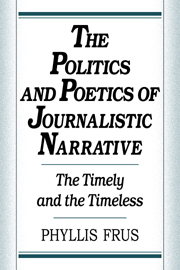Book contents
- Frontmatter
- Contents
- Preface: True Stories
- Acknowledgments
- Introduction: What Isn't Literature
- 1 Writing After the Fact: Crane, Journalism, and Fiction
- 2 “News That Stays”: Hemingway, Journalism, and Objectivity in Fiction
- 3 News That Fits: The Construction of Journalistic Objectivity
- 4 Other American New Journalisms: 1960s New Journalism as “Other”
- 5 The “Incredibility of Reality” and the Ideology of Form
- 6 Freud and Our “Wolfe Man”: The Right Stuff and the Concept of Belatedness
- Conclusion
- Notes
- Works Cited
- Index
2 - “News That Stays”: Hemingway, Journalism, and Objectivity in Fiction
Published online by Cambridge University Press: 14 September 2009
- Frontmatter
- Contents
- Preface: True Stories
- Acknowledgments
- Introduction: What Isn't Literature
- 1 Writing After the Fact: Crane, Journalism, and Fiction
- 2 “News That Stays”: Hemingway, Journalism, and Objectivity in Fiction
- 3 News That Fits: The Construction of Journalistic Objectivity
- 4 Other American New Journalisms: 1960s New Journalism as “Other”
- 5 The “Incredibility of Reality” and the Ideology of Form
- 6 Freud and Our “Wolfe Man”: The Right Stuff and the Concept of Belatedness
- Conclusion
- Notes
- Works Cited
- Index
Summary
Objectivity and again objectivity, and expression: no hindside-beforeness, no straddled adjectives (as “addled mosses dank”), no Tennysonianness of speech; nothing – nothing that you couldn't, in some circumstance, in the stress of some emotion, actually say.
– Ezra Pound, letter to Harriet Monroe (Jan. 1915)Literature is news that stays news.
– Pound, ABC of Reading (1932)The characteristics that lead us to regard Crane's two accounts of surviving a disaster at sea as journalism on the one hand and a short story on the other are not inherent in the texts. Although we may believe that journalism and fiction are qualitatively different, we are taking our cues from the contexts in which we find them and from particular narrative conventions that we reify as properties of fictional texts, such as third-person point of view and the existence of two levels of narration in the short story. On the basis of extrinsic factors, we identify the texts either as obviously literary (capable of conveying universal truths) or as journalistic (belonging to the medium that reports everyday facts).
These generalized distinctions, in turn, produce a particular version of literary history, such as the widely held view that the founders of realism, from Twain to Hemingway, were journalists first. In this view, writers practice their powers of observation and impersonal narration at the city desk and then apply them to invented characters and to subjects with a broader appeal.
- Type
- Chapter
- Information
- The Politics and Poetics of Journalistic Narrative , pp. 53 - 89Publisher: Cambridge University PressPrint publication year: 1994

